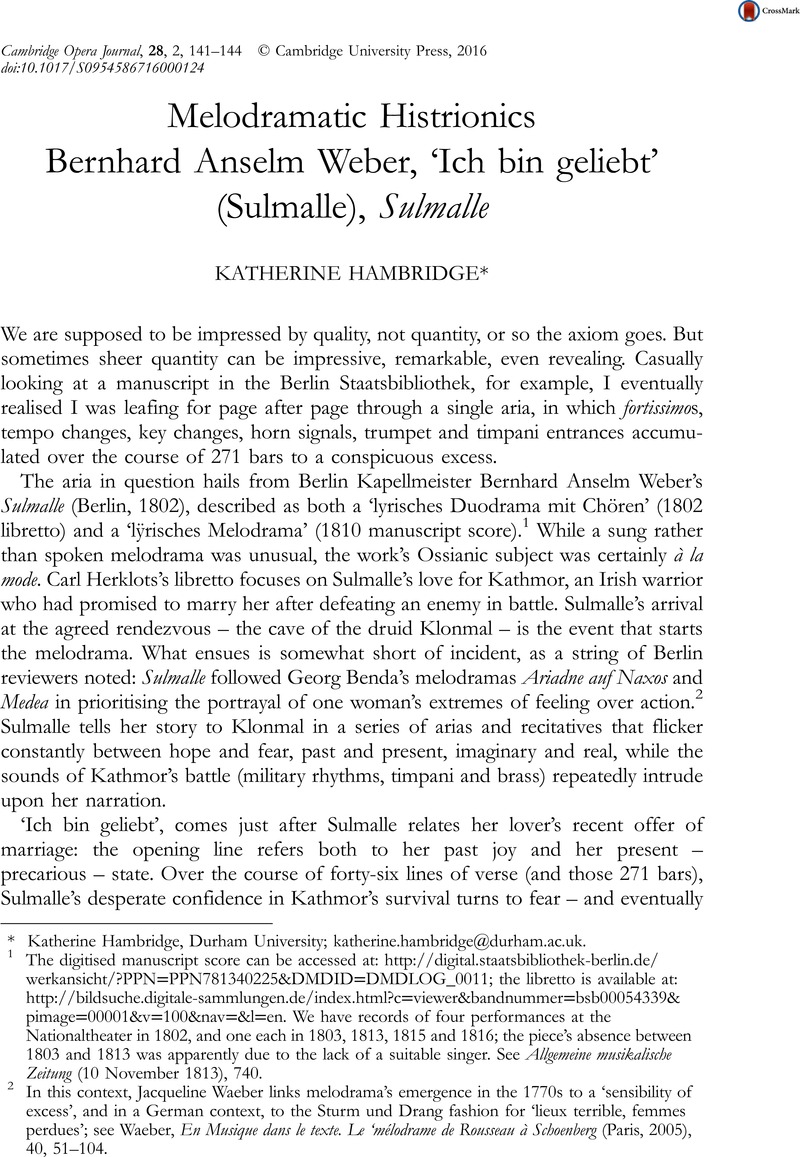No CrossRef data available.
Article contents
Melodramatic Histrionics Bernhard Anselm Weber, ‘Ich bin geliebt’ (Sulmalle), Sulmalle
Published online by Cambridge University Press: 28 September 2016
Abstract

- Type
- Research Article
- Information
- Cambridge Opera Journal , Volume 28 , Special Issue 2: Special Issue: Remaking the Aria , July 2016 , pp. 141 - 144
- Copyright
- © Cambridge University Press 2016
Footnotes
Katherine Hambridge, Durham University; katherine.hambridge@durham.ac.uk.
References
1 The digitised manuscript score can be accessed at: http://digital.staatsbibliothek-berlin.de/werkansicht/?PPN=PPN781340225&DMDID=DMDLOG_0011; the libretto is available at: http://bildsuche.digitale-sammlungen.de/index.html?c=viewer&bandnummer=bsb00054339&pimage=00001&v=100&nav=&l=en. We have records of four performances at the Nationaltheater in 1802, and one each in 1803, 1813, 1815 and 1816; the piece’s absence between 1803 and 1813 was apparently due to the lack of a suitable singer. See Allgemeine musikalische Zeitung (10 November 1813), 740.
2 In this context, Jacqueline Waeber links melodrama’s emergence in the 1770s to a ‘sensibility of excess’, and in a German context, to the Sturm und Drang fashion for ‘lieux terrible, femmes perdues’; see Waeber, , En Musique dans le texte. Le ‘mélodrame de Rousseau à Schoenberg (Paris, 2005), 40, 51–104 Google Scholar.
3 This comes from reviews: neither the score nor the libretto indicates how Sulmalle dies.
4 Waeber, En Musique, 31–9.
5 Waeber, En Musique, 54.
6 Allgemeine Theaterzeitung (November 1800), 322.
7 Hoffmann, E.T.A., ‘Sulmalle’, Dramaturgisches Wochenblatt (14 October 1815), 114–115 Google Scholar; Annalen des Nationaltheaters (27 February 1802), 141–3; Allgemeine musikalische Zeitung (15 June 1802), 623; Vossiche Zeitung (17 March 1803).
8 Rehding, Alexander, Music and Monumentality: Commemoration and Wonderment in Nineteenth-Century Germany (New York, 2009), 28 CrossRefGoogle Scholar.
9 Michaelis, Christian Friedrich, ‘Einige Bemerkungen über das Erhabene der Musik’, Berlinische musikalische Zeitung 1/46 (1805), 179 Google Scholar; trans. in Huray, Peter Le and Day, James, eds., Music and Aesthetics in the Eighteenth and Early Nineteenth Centuries, abridged edn (Cambridge, 1988), 203 Google Scholar.
10 Charlton, David, ‘Storms, Sacrifices: The “Melodrama Model” in Opera’, in French Opera 1730–1830: Meaning and Media (Aldershot, 2000), 1–61 Google Scholar; Sala, Emilio, L’opera senza canto: il mélo romantico e l’invenzione della colonna sonora (Venice, 1995), 50 Google Scholar.
11 Waeber also speaks of melodrama’s ‘excès de sens’ in terms of its tautological employment of text and music: En musique, 39–40; Peter Brooks sees melodrama as a ‘mode of the bigger-than-life’ through its ‘heightened dramatization’, where overlapping media (text, music, gesture, scenery) overstate and overemphasise the character’s deepest feelings. See Brooks, , The Melodramatic Imagination. Balzac, Henry James, Melodrama, and the Mode of Excess, rev. edn (New Haven, 1995)Google Scholar, esp. xiii, 36 and 54.




